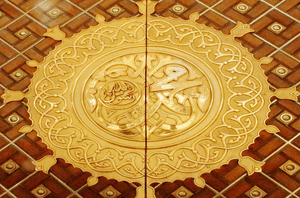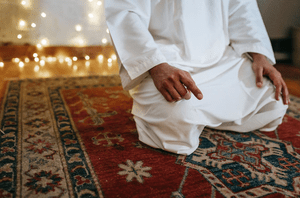Now that you have uttered the takbīr, remind yourself that you are standing in front of Allah.
Lower your head
Stand in front of Allah (ʿazza wa jall) the way a humble slave stands in front of his master. Remember whom you are standing before. Let your worldly qiyām (standing) remind you of the final qiyām, when you will stand on the Day of Judgement in front of the Compeller of the heavens and the earth. Lower your head and your gaze. Stop your eyes from wandering right or left. Do not glance at your surroundings. Keep your gaze fixed to the ground to help keep your focus.
ʿĀ’ishah (raḍiy Allāhu ʿanhā) asked the Messenger of Allah ﷺ about when one looks here and there in ṣalāh. He ﷺ said, “It is snatching, which Shayṭān steals from the slave’s prayer” (Bukhārī).
The Messenger of Allah ﷺ said, “Allah will continue to turn towards the slave whilst he is in his prayer for as long as he does not look away. If he looks away, He will turn away” (Abū Dāwūd).
Ibn al-Qayyim (raḥimahullāh) wrote, “The slave of Allah (ʿazza wa jall) stands in front of his Lord on two occasions: the first is when he stands in his ṣalāh and the second is when he will meet Him on the Day of Judgment. Whoever fulfils the rights of the first standing, the second standing will be made easy for him. And whoever belittles, neglects and does not fulfil the rights of the first standing (i.e. ṣalāh), the second standing will be made very difficult for him.”
Once, ʿAbdullāh b. ʿUmar (radiy Allāhu ʿanhumā) recited Sūrah al-Muṭaffifīn, until he reached the āyah:
يَوْمَ يَقُوْمُ النَّاسُ لِرَبِّ الْعَالَمِيْنَ.
“The Day when mankind will stand before the Lord of the worlds” (83:6).
He cried until he collapsed and was unable to resume his recitation.
The positioning of the hands
Why do you fold your hands and place them over each other?
Imagine you walk into a palace and see two groups of people: one group have their hands on their hips, eyes roaming around everywhere, whilst the second group have their hands neatly clasped together and are respectfully looking down. Seeing this, you would easily identify those who are royalty and those who are the servants. Similarly, as you are a servant standing in front of Allah, placing one hand on the other respectfully symbolises your humility in front of Him.
Placing one hand over the other also prevents fidgeting and is conducive to attaining khushūʿ.
When you stand in prayer, stand in obedience and humility as Allah (ʿazza wa jall) has ordered you. Beware of negligence and looking here and there. Beware of looking at something else whilst Allah is looking at you. Beware of asking Allah (ʿazza wa jall) for Paradise and seeking His protection from the Hell-fire, yet your heart is heedless, and you do not know what your tongue is saying.” – al-Ḥasan al-Baṣrī (raḥimahullāh)






